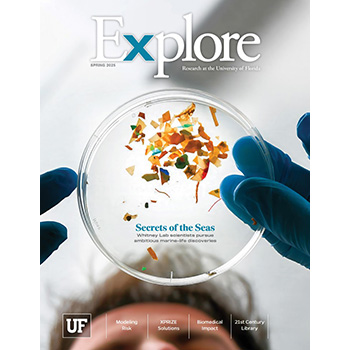
UF Explore Magazine, Spring 2025
Secrets of the Seas - Whitney Lab scientists pursue ambitious marine-life discoveries
Read the full article: https://explore.research.ufl.edu/secrets-of-the-sea.html
UF Research explores how University of Florida researchers’ contributions are changing the world around us.
Video Spotlights
Specializing in sea turtle tumors, plastic ingestion, and environmental DNA (eDNA), Assistant Professor of Wildlife Disease Genomics David Duffy joined the UF Whitney Laboratory for Marine Bioscience in 2015 and proposed using human cancer treatment techniques for sea turtles. His team discovered genetic similarities between turtle tumors and human skin cancer, leading to a significant reduction in tumor recurrence in turtles using an anticancer drug.
Duffy now utilizes eDNA for efficient wildlife surveys. He is also addressing the critical issue of plastic ingestion that poses severe health risks to sea turtles. Supported by Whitney lab's facilities, Duffy continues to study the impact of plastics on sea turtles.
Associate Professor of Chemistry Sandra Loesgen and her lab at Whitney Laboratory for Marine Bioscience, University of Florida, explores the world for microbes that can be turned into medicines. Initially aiming to be a doctor, she shifted to chemistry after realizing her passion for the science behind medicine. Loesgen's research spans cancer, viral infections, and pain suppression, focusing on "chemically talented" microbes that live symbiotically within hosts.
Loesgen's work includes discovering a bacterium that inhibits melanoma cells and a fungus targeting triple-negative breast cancer cells. Collaborating with other researchers, she aims to develop non-opioid painkillers using microbes from her lab.
A developmental biologist, Mark Q. Martindale spent 12 years running his own lab while leading the Whitney Laboratory. He was drawn to the University of Florida due to its strong interest in Whitney and its unique environment, which he describes as a "living laboratory."
At the end of 2024, Martindale returned to full-time research, focusing on jellyfish regeneration and coral bleaching. Martindale's work includes support from the National Science Foundation (NSF) to study the "upside down" jellyfish to understand coral-alga relationships, potentially aiding coral reef restoration.
He also investigates biomineralization, aiming to apply his findings to human health. Martindale collaborates with a Mayo Clinic cardiologist to explore removing calcifying proteins from human blood, embodying the Whitney Lab's mission to learn from nature for human health benefits.
At the Whitney Laboratory’s Sea Turtle Hospital, care never stops. While most turtles spend 6–9 months in rehab, program manager Catherine Eastman and her small team work year-round—rescuing turtles from hurricanes, fishing gear, and cold snaps. In one brutal winter week, they treated 119 cold-stunned turtles.
What began as Eastman’s “Home Depot-style” idea has grown into a vital operation treating hundreds of turtles annually on a modest budget. Their creativity knows no bounds—like crafting a custom life jacket to help a turtle hold their head up after an injury.
But this hospital is more than a rescue center. It’s a research powerhouse. Embedded in a marine lab, it’s the only university-affiliated facility in Florida treating turtles with fibropapilloma tumors. Molecular biologist, David Duffy is using cancer genomics to study these tumors—some of which share traits with human cancers—and explore new treatments.
Sea turtles, with their long lifespans and environmental exposure, are ideal models for understanding cancer and pollution’s effects on living beings. Duffy and Eastman’s work is revealing how plastic and toxins impact both turtles and humans.